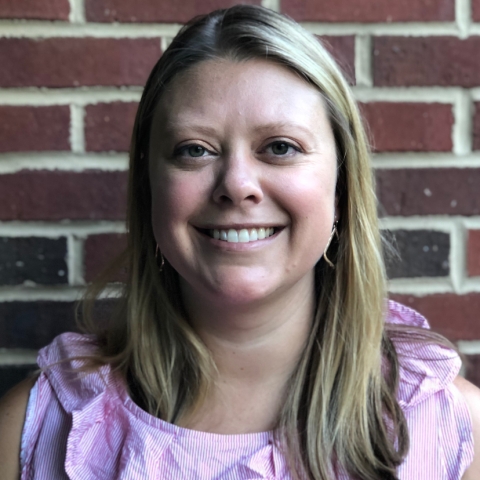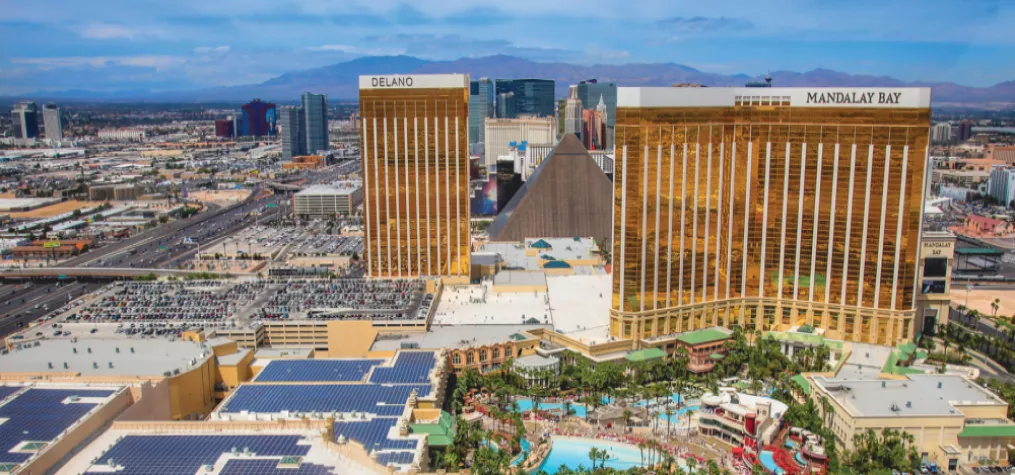Corporate Event Expert Q&A: Angie Ahrens, Vice President of Operations for Leadercast

Known for her fierce leadership, creative approach to events and impressive collection of brightly colored Tieks flats, Angie Ahrens, CMP, is a well-known face in the corporate events industry. She’s currently vice president of operations for Leadercast, a role she began in November last year. Prior to that, she worked as senior director of meetings and events with Connect, managing more than 30 shows for meeting professionals. And in all her spare time, she finds a way to give back, currently serving on Events Industry Council’s Sustainability Committee as well as MPI’s Women’s Advisory Board.
We sat down with Ahrens to talk about what it’s like growing Leadercast’s event program, the secret to work-life balance and how she empowers her team.
Tell me about your role at Leadercast.
The company was founded in 2002 to catapult the concept of leadership in corporate business. In 2007, John Maxwell grew the company into multiple events, even partnering with Chick-Fil-A at one point. In 2014, Leadercast rebranded and launched independently. In the past few years, however, they took a pause in the cultivation and creation of events to narrow down the mission and focus, [which is] to build a world filled with better leaders.
Leadercast hadn’t had an events person on staff in a few years. They were working with third-party vendors around the city, but realized they needed to bring events back in house. Essentially, they combined three jobs that had opened up and created my role. [I was hired] to help grow the events, and to put more procedures and processes into place. [They knew that] when you operate as many events as I did [at Connect], you have to have a process, so I’ve started to implement that here.
What events do you work on?
We currently have two: Leadercast Live and Leadercast Women. Live is world’s largest leadership conference—it draws more than 4,000 people to Atlanta, and we also broadcast it to hundreds of host sites. Think of it like a church broadcast; they host their own events based on our content. We have nine speakers, and then the hosts might fill the rest of the day with a panel, another speaker or networking opportunities.
Leadercast Women is the same model, with nine speakers, but all women. It’s not a women’s empowerment event, but is inclusive and diverse. We invite all genders and races to this event to showcase that women leadership is powerful. As a planner, finding women speakers was always really difficult. We want to showcase that women leaders are available and growing around the world today.
New this year, we’re launching some local events. For example, in late July, we broadcast our content from our Live 2019 event to about 100 corporate leaders in northwest Arkansas, and we’ll also do a women-focused event there in November with content repurposed from October’s Leadercast Women. We plan on expanding again regionally in 2020. We want to look at doing four regional events where we take some of our live speakers from the stage and put them together with our video content, so we’ll travel around a bit like a tour.
In addition to events, what else does your role encompass?
I oversee all departments with the exception of external sales. I spend a lot of time managing operations and the client success team; once the external sales team sells a host site, they teach them how to plan an event through resources and webinars, so we’re talking to them monthly. We show them how to market and do their ticket sales. I also oversee marketing, as well as content. We are a platform, so not only do we have live events, but also blogs, a podcast, an online library and webinars.
How do you develop your own leadership?
We have something called Evolve, which started off as Leadercast staff professional development on a Friday morning once a month. We have an outside speaker come in so we learn how to walk the walk. It has turned into something larger — basically the community educating the community on leadership — as we are expanding those to be 100-person events every month, based in Atlanta. We created this for our team only to have our community see its potential, which leads to more staff development through community networking. And that is exactly what we do: Create opportunities for individuals to become better leaders through educational content and networking. It makes sense that our staff development turned into something we could do on a larger scale, giving back to the community in a different way.
Outside of Leadercast, I read, listen to podcasts and speak with people in the community. One of my main roles is booking leadership speakers, so research is professional development for me. As a lifelong learner, it works perfectly for me.
Coming from a company where you planned events for event professionals, do you feel less pressure now?
It’s a different kind of pressure. I’m still doing events, but they’re only one day. There are just different stressors — more emphasis on AV and speakers versus F&B and hotel blocks.
Honestly, the events are the least part of my stress here. The management of a larger team is different for me, as there are areas I dabbled in before but am now overseeing. That being said, I have way more time to be strategic and thoughtful about the events. Before, I was just pushing them out, hoping we’d get them all done. Here, we take our time to think about the theme of the events and how all nine speakers feed into that very specifically.
You’re a big advocate of work-life balance. What tips and tricks have you learned over the years?
Always have open communication with your supervisor about the expectations. I did this even before beginning my new position, to see what was expected versus what I was looking for. I always continue to revisit this too as necessary. For instance, if I’m leaving on holiday, I like to add into my email signature ahead of time that I’ll be out of the office on specific dates; put it on a staff calendar; and also ask my team how I can serve them prior to being out. Reminders are important to set that clear precedent.
As a leader of the company, I have to lead by example. The team can see the flexibility that I have, and that comes because the work is getting done. I expect the same thing out of them — work hard, play hard. At the same time, we also talk about the 20-40-60 rule: If you’re only working 20 hours but if you’re a full-time employee, maybe we aren’t using your time to the best of your ability. If you’re working 60 or more, we’re abusing you and need to take some stuff on your plate. We want you around that 40-hour flex period pretty regularly. Some weeks you may be at 20, some at 60 — but we want you to balance that.
Having such a supportive husband who understands the workflow and keeps me accountable is so important, too. I turn off the email notifications on my phone. When we travel personally, I absolutely remove [my work account from my phone] and ensure the team knows I’m not answering emails. That’s also part of empowering my team to answer questions while I’m gone. There should be no reason you can’t continue business when leadership is gone if you empower the right people. And people need that time away — it only makes my time on stronger, as a leader.
If you could go back 10 years and give advice to your younger self, what would you say?
Keep networking and getting involved. As a young person in the industry, sometimes it’s hard to get out there and meet people and have them take you seriously. Putting myself out there and making connections is why I’ve always been recruited for jobs. Be that lifelong learner you have always been — never let it stop.
Don't miss any event-related news: sign up for our weekly e-Newsletter HERE and engage with us on Twitter, Facebook, LinkedIn and Instagram!


Add new comment